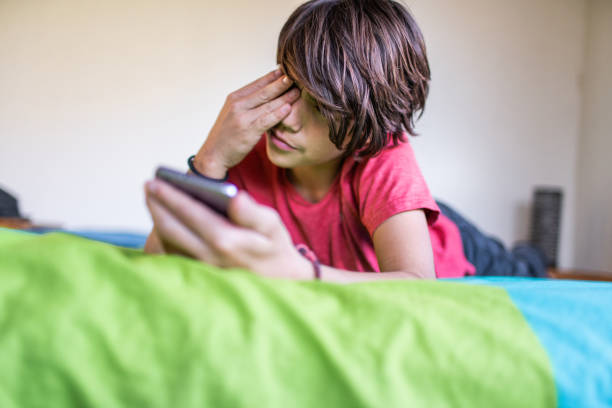Introduction
Table of Contents
Social media has become an integral part of teen life, but it also brings challenges. One of the most concerning issues is the rise of social media addiction, which is increasingly affecting adolescents. The constant connection to platforms like Instagram, TikTok, and Snapchat has made it difficult for many teens to disconnect. As a parent, teacher, or caregiver, it’s essential to understand the signs of social media addiction. This blog post will explore the warning signals that may indicate a teen is struggling with this issue and provide tips on how to help them.
What is Social Media Addiction?
Social media addiction refers to excessive use of social media platforms to the point where it negatively impacts daily life. Teenagers, in particular, are vulnerable due to their stage of development, social pressure, and desire for validation. While not officially recognized as a mental health disorder, the consequences of addiction can be significant. These include decreased academic performance, social isolation, poor mental health, and disrupted sleep patterns. Recognizing the early signs is crucial to addressing the issue before it escalates.
7 Warning Signs of Social Media Addiction in Teens
1. Preoccupation with Social Media
Teens addicted to social media often think about their online profiles even when they are not using their phones. This preoccupation can manifest in conversations where the teen constantly talks about what’s trending, the number of likes on their posts, or the latest updates from friends. If social media is always on their mind, it may be a sign of addiction.
2. Excessive Screen Time
A major indicator of social media addiction is the sheer amount of time a teen spends on their devices. When a teen spends several hours a day on their phone, particularly on social media, and neglects other activities such as schoolwork, chores, or face-to-face interactions, it’s a warning sign. Setting screen time limits can be an effective way to gauge how much time is being spent online.

3.Decline in Real-Life Social Interactions
As social media consumption increases, face-to-face interactions often decrease. Teens may begin to isolate themselves, preferring to connect with others through their screens rather than engaging in person. If your teen is avoiding family events, social gatherings, or outdoor activities, it could be a sign they are becoming overly reliant on social media for socializing.
4. Mood Swings and Irritability
Teens with social media addiction often experience mood swings. They may become irritable, anxious, or upset when their social media accounts are interrupted or if they aren’t receiving enough engagement on their posts. This emotional dependency on online validation is a major red flag of addiction.

5.Lack of Interest in Other Hobbies
A teenager with social media addiction might lose interest in activities they once enjoyed, such as reading, sports, or hobbies. If you notice that your teen no longer participates in any extracurricular activities and spends all their time on their phone, this could indicate an unhealthy obsession with social media.
6.Sleep Disturbances
Social media addiction can interfere with sleep. Teens may stay up late scrolling through their feeds, leading to sleep deprivation. If your teen regularly feels tired or irritable due to lack of sleep, it may be due to their social media habits. Encourage healthier sleep routines by setting limits on phone use before bed.

7.Neglecting Responsibilities
When social media consumption becomes excessive, teens often neglect important responsibilities. This includes skipping homework, not attending school, or forgetting to do household chores. If you see your teen consistently procrastinating or failing to meet deadlines, it’s time to take a closer look at their social media habits.
How Social Media Addiction Affects Teens
Social media addiction can have serious consequences for teens. These include:
- Mental Health Issues: Teens may develop anxiety, depression, and low self-esteem due to social media comparisons and online bullying.
- Impaired Social Skills: Spending too much time online can lead to a lack of face-to-face communication skills, affecting personal relationships.
- Academic Problems: Excessive time on social media can distract teens from their studies, leading to lower grades and academic struggles.
- Physical Health Problems: A sedentary lifestyle due to constant screen time can contribute to obesity and related health issues.
Tips for Parents: How to Manage Social Media Use
If you notice signs of social media addiction in your teen, there are several ways to help them manage their screen time:
- Set Boundaries on Screen Time
Establish clear rules about when and how long your teen can use social media each day. For example, limit screen time to an hour or two per day and avoid social media during meal times or right before bed. Setting healthy boundaries helps your teen develop a balanced relationship with technology. - Encourage Face-to-Face Interactions
Encourage your teen to spend time with friends and family in real-life settings. Invite them to engage in activities such as playing sports, going to the movies, or attending social gatherings. These real-world interactions help reduce the dependency on social media for social validation. - Model Healthy Social Media Habits
Be a role model for your teen by showing how to use social media responsibly. Avoid spending excessive time on your phone, especially around your teen. Practice good digital habits such as not checking your phone during family time or meals. - Create a Social Media Contract
Work with your teen to create a social media contract that outlines acceptable online behavior, time limits, and the consequences of breaking the rules. Having a written agreement can help your teen understand the importance of balance in their digital and real-world activities. - Promote Other Interests and Hobbies
Help your teen discover new interests and hobbies outside of social media. Encourage them to participate in activities like reading, drawing, or playing an instrument. These activities provide an alternative outlet for creativity and relaxation. - Provide Emotional Support
If your teen is struggling with the emotional impacts of social media, such as body image issues or cyberbullying, provide support. Encourage open conversations about how they feel online and help them navigate difficult situations. Counseling or therapy may be necessary if your teen is dealing with anxiety or depression due to social media use.
Conclusion
Social media addiction is a growing concern for teens, but by recognizing the signs early, you can help your teen develop a healthier relationship with technology. Setting boundaries, encouraging offline activities, and providing emotional support can help your teen regain control over their social media use. It’s essential to maintain an open line of communication and offer guidance to ensure your teen’s mental and physical well-being. If you notice persistent signs of addiction, consider seeking professional help to address the issue.
Frequently Asked Questions
What are the signs of social media addiction in teens?
The signs of social media addiction in teens include excessive screen time, preoccupation with online profiles, mood swings, and neglect of responsibilities. Teens may also experience a decline in real-life social interactions and a lack of interest in hobbies.
How can I help my teen with social media addiction?
Helping your teen with social media addiction involves setting screen time limits, encouraging face-to-face interactions, and promoting hobbies outside of social media. Having open conversations about the emotional impact of social media can also help.
What is the impact of social media addiction on teens?
Social media addiction can lead to mental health issues, academic struggles, poor sleep, and impaired social skills. Teens may also experience increased anxiety, depression, and poor self-esteem due to social media comparisons.
How much screen time is healthy for teens?
Experts recommend that teens have no more than two hours of recreational screen time per day. Encouraging offline activities and healthy routines can help balance their social media use.
Can social media addiction lead to depression in teens?
Yes, excessive social media use can contribute to feelings of anxiety, depression, and low self-esteem in teens. The constant comparison to others and online bullying can exacerbate these issues.



